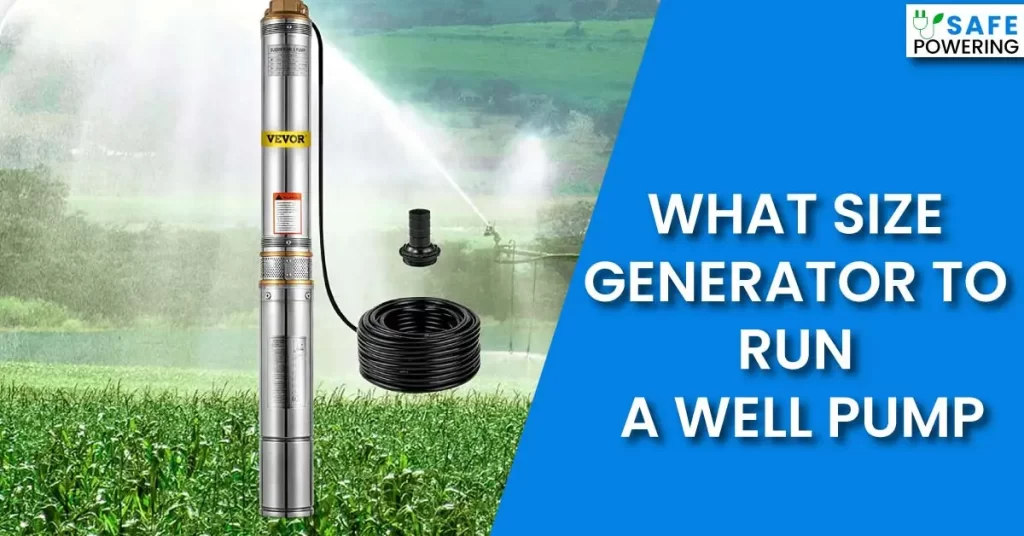What Size Generator to Run a Well Pump? Top 5 Suggestions
If you want to know “What Size Generator to Run a Well Pump” without seeking professional help and watching lengthy videos, read this article.
When it comes to running a well pump with a generator, choosing the appropriate generator size is crucial to properly run it.
The size of the generator required to run a well pump depends on several factors such as the horsepower of the pump, the type of motor, and the starting and running wattage requirements of the pump.

The size of the generator needed to run a well pump depends on the horsepower of the pump, motor type, and starting and running wattage requirements. A generator with enough wattage to handle the starting surge of the pump motor without overloading the generator is essential. Typically, a generator with a capacity of 3,000 to 8,000 watts is sufficient to power most well pumps.
In this article, we will try to accurately describe the size of the generator required to run a well pump of different power ratings.
How Do You Power a Well Pump with a Generator?
You will a transfer switch and proper wiring for this kind of operation. A transfer switch is essential to automatically turn ON/OFF the generator during outages.
The generator needs to be properly grounded as well, and proper wiring ensures maximum safety to prevent electrocution.
Once everything is set, follow these steps:
How Many Watts Does It Take to Run a Well Pump?
The wattage required to run a well pump varies depending on the size and type of the pump.
The power needed to start the pump is typically higher than the power required to keep it running.
To determine the wattage needed, you can check the pump’s energy labeling, User manual or consult the manufacturers.
I also have some calculations written for you which help you to understand the wattage requirement.
Ecample1: let’s assume we have a submersible well pump with the following specifications:
- Horsepower: 1 HP
- Voltage: 240V
- Amperage: 8.3A
To calculate the wattage required to start the pump, we can use the formula:
Starting watts = Horsepower x 2 x Voltage
So, in our case, the starting watts required would be:
Starting watts = 1 HP x 2 x 240V = 480 watts
To determine the running watts required, we can use the formula:
Running watts = Voltage x Amperage
In our case, the running watts required would be:
Running watts = 240V x 8.3A = 1,992 watts
Therefore, to run this well pump, a generator with a capacity of at least 2,472 watts (480 + 1,992) would be required.
It’s important to note that it’s always best to choose a generator with a slightly higher capacity than the minimum required to account for any additional power needs or surges.
Example 2: Shallow well jet pump.
Horsepower: 1/2 HP
Voltage: 115V
Amperage: 9.8A
Starting watts = 1/2 HP x 2 x 115V = 115 watts Running watts = 115V x 9.8A = 1,127 watts Total watts = 1,242 watts
In this case, a generator with a capacity of at least 1,242 watts would be required to run the pump.
Example 3: Deep well submersible pump.
Horsepower: 1.5 HP
Voltage: 230V
Amperage: 9.2A
Starting watts = 1.5 HP x 2 x 230V = 690 watts Running watts = 230V x 9.2A = 2,116 watts Total watts = 2,806 watts
In this case, a generator with a capacity of at least 2,806 watts would be required to run the pump.
Recommended Read: What size generator do I need for a sump pump?
Why Isn’t My Well Pump Working?
1. No Power
If the well pump is not receiving power, it won’t be able to function. The first step in troubleshooting this issue is to check the circuit breaker or fuse box to see if there’s a tripped circuit or blown fuse.
Also, ensure that the well pump switch is turned on. If the problem persists, you may need to have an electrician examine the wiring.
2. Pressure Switch Failure:
The pressure switch on well pump controls when the pump turns on and off based on the water pressure in the system.
If the pressure switch fails, the pump may not turn on at all. In this case, you’ll need to have the pressure switch replaced by a qualified technician.
3. Well Pump Motor Failure:
The motor on a well pump can fail due to a variety of reasons such as age, wear and tear, or electrical issues. If the motor is not functioning properly, you’ll need to have it repaired or replaced by a professional.
4. Low Water Levels:
If the water level in your well drops below the pump’s intake, the pump won’t be able to draw water and will stop working.
If this is the case, you may need to have the well dug deeper or the pump relocated to a lower point in the well.
5. Clogged or Damaged Pipes:
Debris or damage to the pipes that lead to the well pump can prevent water from reaching the pump and cause it to stop working.
In this case, you’ll need to have the pipes inspected and repaired or replaced as necessary.
6. Faulty Control Box:
If your well pump uses a control box, it may be faulty and need to be replaced. The control box contains the electrical components that regulate the pump’s function, so if it’s not functioning correctly, it can prevent the pump from working.
7. Old Well Pump:
Over time, well pumps can wear out and fail, especially if they’re not properly maintained. If your well pump is over 10 years old, it may be time to consider replacing it.
What are the Best Generators Well Pumps?
| Generator Model | Power Output | Fuel Type | Weight | Noise Level | Features |
| Honda EU2200i | 2200 watts | Gasoline | 47 pounds | 48 decibels | Inverter technology, fuel-efficient |
| Generac GP6500E | 6500 watts | Gasoline | 202 pounds | 74 decibels | Electric start, large fuel tank |
| Westinghouse WGen7500DF | 7500 watts | Dual fuel (gasoline/propane) | 201 pounds | 64 decibels | Electric start, remote start capability |
| DuroMax XP12000EH | 12,000 watts | Dual fuel (gasoline/propane) | 224 pounds | 72 decibels | Electric start, multiple outlets |
| Briggs & Stratton 30681 | 8000 watts | Gasoline | 224 pounds | 80 decibels | Electric start, multiple outlets |
Frequently Asked Questions (FAQs)
Why Do I Need a Generator to Run My Well Pump?
Well pumps are typically powered by electricity, and if there is a power outage or other interruption in the electrical supply, the pump won’t work. A generator can provide backup power to keep the pump running during an outage or other emergency.
What Size Generator to Run a Well Pump?
In general, a well pump with a 1 horsepower (HP) motor will require a generator with a capacity of at least 5,000 watts (W), but it’s best to consult with a professional to determine the specific requirements for your pump.
How Do I Calculate the Wattage Needed for My Well Pump?
To calculate the wattage needed for your well pump, multiply the horsepower of the motor by 746 (which is the number of watts in 1 HP), and then multiply that by the pump’s efficiency rating (which is typically between 50% and 75%). For example, if your pump has a 1 HP motor and a 60% efficiency rating, the wattage required would be 746 x 1 x 0.6 = 447.6 watts.
What Other Factors Should I Consider When Choosing a Generator for My Well Pump?
In addition to the wattage required to power your well pump, you should also consider factors such as the fuel type (gasoline, propane, diesel, etc.) and the runtime of the generator (i.e., how long it can run continuously on a full tank of fuel).
You may also want to consider other features, such as automatic startup and shut-off, noise level, and portability.

Fareed, the highly skilled electrical expert, boasts 5 years of extensive experience in proficiently maintaining, repairing, diagnosing, and installing a diverse range of electrical systems.
